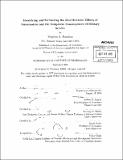| dc.contributor.advisor | Joshua D. Angrist, Whitney K. Newey and David Autor. | en_US |
| dc.contributor.author | Frandsen, Brigham R | en_US |
| dc.contributor.other | Massachusetts Institute of Technology. Dept. of Economics. | en_US |
| dc.coverage.spatial | n-us--- | en_US |
| dc.date.accessioned | 2011-04-25T15:52:29Z | |
| dc.date.available | 2011-04-25T15:52:29Z | |
| dc.date.copyright | 2010 | en_US |
| dc.date.issued | 2010 | en_US |
| dc.identifier.uri | http://hdl.handle.net/1721.1/62397 | |
| dc.description | Thesis (Ph. D.)--Massachusetts Institute of Technology, Dept. of Economics, 2010. | en_US |
| dc.description | Cataloged from PDF version of thesis. | en_US |
| dc.description | Includes bibliographical references. | en_US |
| dc.description.abstract | This thesis is concerned with the economic consequences for individuals of two important U.S. labor market institutions: unionization and the military draft. The first chapter develops an econometric procedure for estimating quantile treatment effects in a regression discontinuity design. It shows nonparametric identification, develops estimators, including a data-driven bandwidth choice, and illustrates the methodology by estimating the effects of an Oklahoma universal pre-K program on the quantiles of student outcomes. The second chapter applies the econometric procedure developed in the first chapter and estimates effects of unionization on the distribution of employees' earnings using a regression discontinuity design based on union certification elections. The results suggest that unionization raises the lower end of the distribution by up to 25 log points, but has a large negative effect on the upper tail of earnings, with little effect on average earnings. Unionization also increases retention among workers with lower pre-election earnings, but decreases it for higher-earning workers. These effects are interpreted as reflecting the political incentives unions face in certification elections. The final chapter (joint with Joshua Angrist and Stacey Chen) explores the long-term effects of Vietnam-era military service on disability outcomes using a research design based on the draft lottery. We find no evidence that military service affected overall employment rates or overall work-limiting disability. At the same time, military service drastically increased federal transfer income, especially for lower skilled white men, among whom there was a large negative impact on employment and an increase in disability rates. The differential impact of Vietnam-era service on low-skilled men cannot be explained by more combat exposure for the least educated, leaving the relative attractiveness of VDC for less skilled men and the work disincentives embedded in the VDC system as a likely explanation. | en_US |
| dc.description.statementofresponsibility | by Brigham R. Frandsen. | en_US |
| dc.format.extent | 136, [1] p. | en_US |
| dc.language.iso | eng | en_US |
| dc.publisher | Massachusetts Institute of Technology | en_US |
| dc.rights | M.I.T. theses are protected by
copyright. They may be viewed from this source for any purpose, but
reproduction or distribution in any format is prohibited without written
permission. See provided URL for inquiries about permission. | en_US |
| dc.rights.uri | http://dspace.mit.edu/handle/1721.1/7582 | en_US |
| dc.subject | Economics. | en_US |
| dc.title | Identifying and estimating the distributional effects of unionization and the long-term consequences of military service | en_US |
| dc.type | Thesis | en_US |
| dc.description.degree | Ph.D. | en_US |
| dc.contributor.department | Massachusetts Institute of Technology. Department of Economics | |
| dc.identifier.oclc | 710812251 | en_US |
